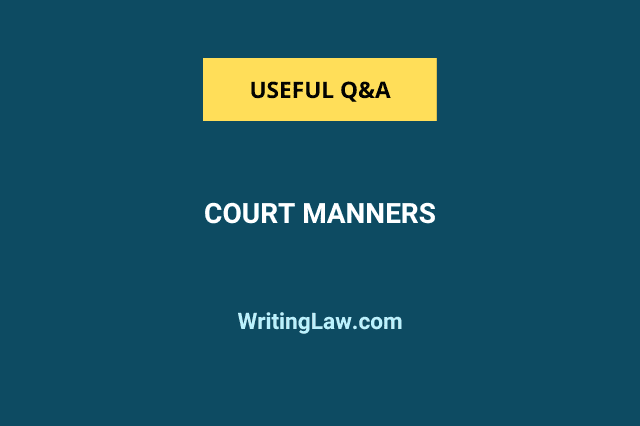
In general, court manners are intended to convey respect and deference to those in positions of power while maintaining a sense of order and decorum in formal settings. In this post, you will read about court manners, their importance, and how they differ from court demeanour.
What Are Court Manners?
Court manners refer to the proper behaviour and etiquette expected of individuals when in the presence of royalty, high-ranking officials, or in a formal court setting. These manners are typically more formal and strict than everyday manners and are meant to show respect and deference to those in positions of authority.
Court manners can include rules about addressing royalty or officials, proper attire, forms of address and greetings, body language and gestures, seating arrangements, and behaviour in the presence of superiors.
Need of Court Manners
Court manners are essential for several reasons.
Firstly, they show respect and deference to those in positions of authority, such as royalty or high-ranking officials. This is important because it helps to maintain a sense of order and decorum in formal settings and can contribute to the smooth functioning of the court or other traditional institutions.
Secondly, court manners are essential because they help to establish and maintain social hierarchies. In many cultures, how people behave and interact with each other is closely tied to their social status.
Finally, court manners are essential because they help to build and maintain relationships between individuals and institutions. By demonstrating respect and deference to those in positions of authority, individuals can build trust and establish connections that may be useful in the future.
Importance of Court Manners
The importance of court manners lies in their ability to promote respect, order, and social cohesion in formal settings. Here are some of the critical reasons why court manners are essential:
1. Showing Respect
Court manners show respect and deference to those in positions of authority, such as royalty or high-ranking officials. This is important because it helps maintain order and decorum in formal settings and can contribute to the court’s or other institutions’ smooth functioning.
2. Establishing Social Hierarchies
In many cultures, the way that people behave and interact with each other is closely tied to their social status. By observing court manners, individuals can demonstrate their respect for those at higher authority, like judges and signal their professional position to others.
3. Building Relationships
Court manners can help to build and maintain relationships between individuals and institutions. By demonstrating respect and deference to those in positions of authority, individuals can establish connections that may be useful in the future.
4. Upholding Traditions
Court manners are often rooted in tradition and can help to preserve cultural practices and customs.
5. Promoting Professionalism
Court manners are typically more formal and strict than everyday manners and can help to promote professionalism and decorum in traditional settings.
6. Maintaining Decorum
Court manners also help to maintain decorum and a sense of order in formal settings. This is particularly important when emotions may be running high or conflicts may arise. By adhering to established court manners, individuals can help keep the situation calm and controlled.
7. Facilitating Communication
Court manners can also facilitate communication between individuals of different backgrounds or cultures. Following established rules of behaviour and etiquette can help create a shared understanding and a sense of common ground.
8. Enhancing Diplomacy
Court manners are often closely tied to diplomacy and can help to promote peaceful relations between nations or groups. By showing respect and deference to others, individuals can help build trust and goodwill, which can be important when tensions are high.
9. Demonstrating Good Character
Finally, observing court manners can be seen as a demonstration of good character. By showing respect and deference to others, individuals can demonstrate that they are trustworthy, honourable, and deserving of respect.
How Court Manners Differ From Court Demeanour?
While court manners and court demeanour are both essential aspects of behaviour in a court setting, they differ in their focus and application.
Court manners refer to the formalized rules of behaviour and etiquette expected of individuals when in the presence of royalty, high-ranking officials, or in a formal court setting.
These manners are typically more formal and strict than everyday manners and are meant to show respect and deference to those in positions of authority. Examples of court manners include addressing a judge or other official, proper attire, seating arrangements, and forms of greeting and salutation.
On the other hand, court demeanour refers to an individual’s overall attitude and behaviour when appearing in court. This can include how a person presents, tone of voice, and general conduct during legal proceedings. Court demeanour is often focused on creating a positive impression on the court, respecting the legal system and its processes, and ensuring that one’s conduct does not interfere with the administration of justice.
While court manners and court demeanour are related, they differ in their specific applications. For example, court manners focus on demonstrating respect and deference to those in positions of authority, while court demeanour focuses on presenting oneself professionally and respectfully in the court setting. Nevertheless, both are essential aspects of behaviour in a court setting and can help to ensure that legal proceedings run smoothly and efficiently.
Read Next:
1. Five Types of Court Opinions and Their Significance
2. Duties of an Indian Advocate Towards the Court, Client, Opponents, and Fellow Advocates
3. Skills Required for Mooting and Its Benefits in Academic and Professional Development
- What Is the Burden of Proof Under the PMLA? - 18th April 2024
- Ranjit D Udeshi vs State of Maharashtra – Case Explained - 11th April 2024
- What Is Proceeds of Crime Under PMLA (With Case Laws) - 7th April 2024







